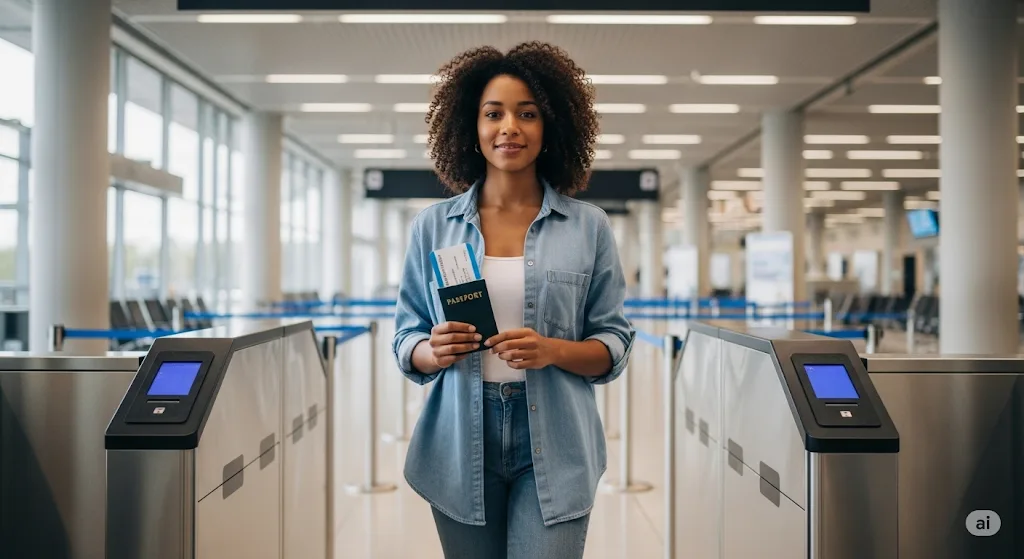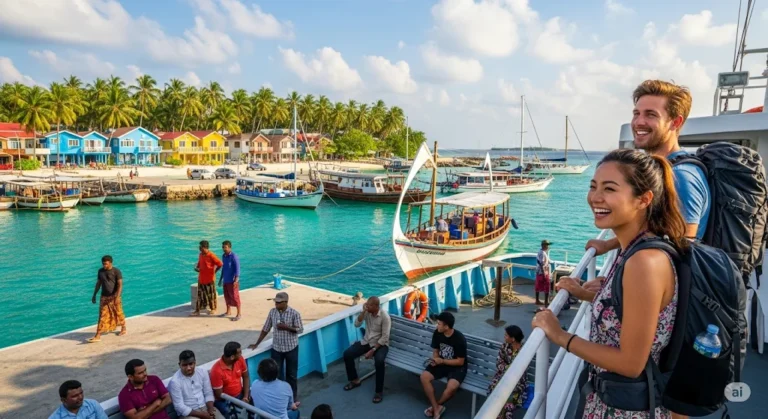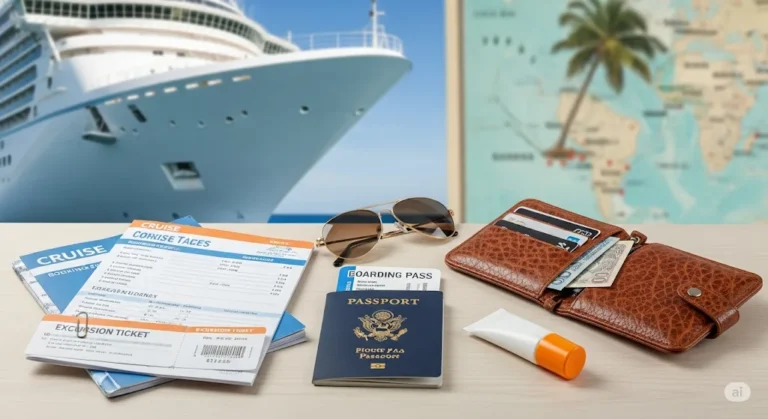Denied Boarding? Avoid Document Mistakes
1. Common Causes of Denied Boarding Due to Document Issues
Understanding the specific reasons why travelers are denied boarding is the first critical step toward preventing such an unfortunate event from happening to you. It’s often not malicious intent, but simple oversights that lead to significant headaches.
1.1. Common Errors and Critical Omissions
Many denied boarding incidents stem from seemingly minor mistakes that carry major consequences. Airlines and border control agencies operate with strict protocols, and even the smallest discrepancy can trigger a refusal.
- Inaccurate Names: This is arguably the most frequent and infuriating error. Your name on the airline ticket **must match exactly** the name on your official travel document (passport or national ID card). This includes all middle names, hyphenated names, and ensuring consistency if you’ve recently changed your name (e.g., due to marriage). A single misspelled letter, an omitted middle name, or even a reversed first and last name can be enough for an airline agent to deny boarding. Always cross-reference your booking confirmation with your passport’s machine-readable zone (MRZ) for absolute accuracy.
- Expired or Insufficiently Valid Documents: Your passport or ID card needs to be valid not just for the duration of your trip, but often for a specific period **beyond** your intended return date. Many countries enforce a “6-month validity rule,” meaning your passport must be valid for at least six months from your date of entry, or sometimes even from your date of planned departure from that country. This buffer accounts for unexpected delays, extended stays, or unforeseen circumstances. Failure to meet this requirement, even by a day, will result in denied entry and consequently, denied boarding. Also, check if your passport has enough blank pages for entry and exit stamps, as some countries require a minimum number.
- Missing or Incorrect Visa: Even if your nationality allows visa-free travel to a certain country, you might still need a visa for a **transit stop** in another country en route. Visa requirements vary widely by nationality and destination. Common mistakes include:
- **No Visa at All:** Assuming visa-free travel when it’s not applicable to your nationality or the purpose of your visit.
- **Incorrect Visa Type:** Using a tourist visa for business purposes, or a single-entry visa when you plan multiple entries.
- **Expired Visa:** Overlooking the validity period of your visa.
- **Incorrect Data on Visa:** Errors in your name, date of birth, or passport number on the visa itself.
- **E-Visas/ETA Not Approved:** Thinking an application is enough, when it needs to be approved and confirmed before travel.
Always verify visa requirements for **all countries** you will enter or transit through.
- Missing or Non-Compliant Health Certificates/Declarations: While COVID-19 related restrictions have largely eased, some countries still require specific health documents (e.g., proof of yellow fever vaccination for specific regions, or health declaration forms). Failure to provide these, or if they don’t meet the precise requirements (e.g., specific test type, timing), can lead to denied boarding. Always check the latest health regulations for your destination and any transit points.
- Missing Return or Onward Ticket: Many countries require non-residents to provide proof of an onward or return ticket as evidence that you intend to leave the country before your authorized stay expires. This is a common requirement to prevent illegal overstays. If you’re planning an open-ended trip, research specific entry requirements for your destination, as some may accept a “proof of funds” or a clear travel itinerary as an alternative.
- Insufficient Proof of Funds: Certain countries may require visitors to demonstrate that they have sufficient financial means to support themselves during their stay. This can be verified through bank statements, credit card limits, or a specified amount of cash. While not always checked at the airport, it can be a reason for denial of entry by immigration, which the airline will try to prevent by denying boarding.
1.2. Required Documents: From Passport to Visa
The type and quantity of documents needed for international travel vary significantly based on your nationality, destination, and the purpose of your trip. A thorough understanding of each document’s role is crucial.
- Passport: This is your primary international identification and travel document. Beyond checking its expiry date, ensure its physical condition is good (no torn pages, water damage, or detached covers). Some countries have advanced biometric passport readers, and damage can cause issues. Ensure your signature page is signed if required.
- National Identity Card: For citizens of the European Union, a national ID card is sufficient for travel within the Schengen Area and most EU member states. However, it’s generally not accepted for travel outside these regions. Always confirm if your ID card is sufficient for your specific destination.
- Visa: A visa is an official endorsement or stamp placed in your passport by a foreign country, granting you permission to enter and stay for a specific period and purpose.
- Types: Tourist, business, student, transit, work, family reunification, etc. Each has specific requirements and limitations.
- Application Process: Can range from simple online applications (e-visas, ETAs like ESTA for USA or eTA for Canada), to complex embassy/consulate applications requiring interviews, extensive documentation, and significant processing times.
- Validity: Pay attention to the visa’s start and end dates, the number of entries permitted (single, double, multiple), and the maximum stay duration (e.g., 90 days in a 180-day period).
- Flight Ticket and Itinerary: While your boarding pass is your entry to the plane, airlines may also require a copy of your full flight itinerary, especially if you have connecting flights or need to prove your onward journey. Keep both physical and digital copies accessible.
- Proof of Accommodation: Many countries, especially for tourist visas, may require proof of your hotel bookings or an invitation letter from a host detailing your stay. This helps border officials verify your travel plans.
- Travel Insurance Policy: While not always a direct boarding requirement, some countries (e.g., Schengen Area for certain nationalities, Cuba, Russia) mandate travel insurance for entry or visa application. Beyond that, a good policy can provide crucial financial protection if your trip is disrupted due to unforeseen document issues.
- Specific Documents for Special Cases:
- International Driving Permit (IDP): If you plan to drive abroad.
- Pet Health Certificates/Passports: Required for traveling with animals, often with strict vaccination and quarantine rules.
- Medication Prescriptions: If carrying specific medications, especially controlled substances, always have a doctor’s note and the prescription.
- Student/Work Permits: For long-term stays, these are critical alongside your visa.
- Marriage Certificates/Birth Certificates: Can be required to prove relationships for family travel or to clarify name discrepancies.
2. Document Verification: Essential Steps Before Travel
Proactive preparation is your strongest defense against denied boarding. A systematic approach to document verification, initiated well in advance, can save you immense stress and expense.
2.1. Your Detailed Document Checklist
Create a comprehensive checklist and review each item methodically, starting weeks or even months before your departure date.
- Check Passport/ID Validity and Condition: This cannot be stressed enough.
- **Expiry Date:** Confirm it meets the 6-month rule for your destination and all transit countries. If it expires sooner, apply for a renewal immediately.
- **Blank Pages:** Ensure you have enough empty pages for entry/exit stamps. Some countries require 2-4 blank pages.
- **Physical Condition:** Inspect for any damage. A torn cover, water damage, or loose pages can render your passport invalid.
- **Photo and Signature:** Ensure your photo is clearly recognizable and your signature matches that on other documents.
- Verify Visa Requirements for ALL Countries: Don’t assume.
- **Destination Country:** Check the specific visa requirements for your nationality.
- **Transit Countries:** Even if you’re only transiting through an airport for a few hours and not leaving the terminal, some countries (e.g., USA, Canada for certain nationalities) require a transit visa or an electronic travel authorization (ETA).
- **Purpose of Travel:** Ensure your visa type matches your travel purpose (e.g., a tourist visa for tourism, not for work).
- **Dual Citizenship:** If you hold multiple passports, be aware of how they interact. Some countries might require you to enter and exit with the same passport, or have specific rules for dual nationals.
- Exact Name Matching on All Bookings: This is a zero-tolerance area for airlines.
- **Airline Ticket:** The name on your flight booking (first name, middle name(s), last name) must exactly match your passport or national ID card.
- **Hotel Bookings/Invitations:** While less critical than flight tickets, consistency across all travel documents is a good practice.
- **Correcting Errors:** If you find a discrepancy, contact the airline or your travel agent immediately. Minor errors (e.g., 1-3 letter spelling mistakes) can sometimes be corrected for a fee. Major discrepancies (e.g., completely different names, swapped first/last names) might require purchasing a new ticket.
- Proof of Itinerary and Onward Travel:
- Keep printed copies of your e-tickets and boarding passes.
- Have clear evidence of your return flight or onward journey (another flight, train ticket, cruise booking), as required by your destination’s immigration.
- Specific Health and Entry Declarations:
- Regularly check official government travel advisories (e.g., your country’s Ministry of Foreign Affairs, the destination country’s embassy website, WHO, CDC) for the latest health requirements.
- Complete any mandatory online health declarations or passenger locator forms *before* arriving at the airport.
- Physical and Digital Copies of All Documents:
- **Physical Copies:** Keep photocopies of your passport, visa, flight tickets, and other critical documents in a separate bag from your originals.
- **Digital Copies:** Scan or photograph all important documents and save them in a secure cloud storage service (e.g., Google Drive, Dropbox), email them to yourself, or store them on your phone (accessible offline). Share copies with a trusted family member or friend back home. This is invaluable if originals are lost or stolen.
2.2. Specific Checks for Children and Special Cases
Traveling with minors or in unique circumstances adds layers of complexity to document requirements, necessitating even greater attention to detail.
- Minors Traveling:
- **Own Passport:** Every child, including infants, must have their own valid passport.
- **Unaccompanied Minors (UM):** If a child is traveling alone, airlines have specific unaccompanied minor services and require extensive paperwork, including notarized consent from parents/guardians, emergency contact information, and specific airline forms.
- **Traveling with One Parent:** This is a very common point of denied boarding. Many countries require a **notarized consent letter** from the absent parent(s), explicitly stating their permission for the child to travel. This letter often needs to be translated into English (or the destination country’s language) by a sworn translator and, in some cases, legalized at the embassy. Always carry the child’s original birth certificate and copies of both parents’ IDs.
- **Traveling with Guardians/Grandparents:** Similar to traveling with one parent, a notarized consent form from both parents is almost universally required, along with proof of guardianship if applicable.
- Business/Study Travel:
- **Invitation Letters:** Carry original (or certified copies) of official invitation letters from the company, university, or organization you are visiting, detailing the purpose and duration of your stay.
- **Enrollment/Employment Proof:** Have documents proving your enrollment in a course or your employment status, as relevant.
- **Company Guarantee Letters:** If your trip is sponsored by an employer, a letter of guarantee covering your expenses might be required.
- Long-Stay or Multi-Entry Visas:
- Understand the specific terms of your visa: How many entries are allowed? What is the maximum stay per entry or cumulatively over a period (e.g., 90 days within any 180-day period)?
- Ensure you are not overstaying your permitted duration, even if your visa itself has a longer validity.
3. Technology and Useful Resources for Verification
Leveraging modern tools and consulting authoritative sources can significantly simplify the document verification process and ensure you have access to the most current information.
3.1. Official Visa and Travel Condition Verification Apps and Websites
In the age of misinformation, relying on official and widely recognized sources is paramount. Avoid outdated travel blogs or forums for critical document information.
- IATA Travel Centre (Timatic): This is the gold standard for airlines. Timatic is the global system used by airlines to instantly check travel document requirements for any itinerary. It compiles entry regulations for almost every country worldwide, including visa rules, health requirements, and passport validity. You can access a public version (often branded as “IATA Travel Centre” or “Timatic”) on many airline websites or directly. Input your nationality, destination, transit points, and it will generate a precise list of requirements. This is the exact information your airline check-in agent will be using.
- Official Government Websites:
- **Your Country’s Ministry of Foreign Affairs (MFA):** Always consult your own country’s MFA website (e.g., the U.S. State Department, UK Foreign, Commonwealth & Development Office, Romania’s Ministerul Afacerilor Externe). These sites provide up-to-date travel advisories, safety warnings, and detailed entry requirements for citizens.
- **Destination Country’s Government Websites:** For the most direct information on visa applications and specific entry rules, visit the official website of the immigration or foreign affairs ministry of the country you intend to visit.
- Embassy and Consulate Websites: When applying for a visa or needing specific clarifications, the website of the destination country’s embassy or consulate in your home country is the definitive source for application forms, required documents, fees, processing times, and appointment scheduling.
- Airline Apps and Websites: Many major airlines integrate travel advisory tools into their booking or check-in processes. While convenient, always cross-reference with IATA Timatic or government sources, as airline information might occasionally lag behind the very latest updates.
3.2. The Importance of Travel Insurance and Consular Assistance
Even with the most meticulous planning, unforeseen circumstances can arise. Having robust travel insurance and knowing how to access consular assistance can be lifesavers.
- Travel Insurance: A comprehensive travel insurance policy can mitigate the financial impact of denied boarding, though it’s crucial to understand its limitations.
- Trip Cancellation/Interruption: Some policies may offer coverage if your trip is canceled or interrupted due to *unforeseen and covered events* that impact your documents (e.g., sudden regulatory changes, loss/theft of passport while traveling, medical emergencies preventing visa application). However, they generally *do not* cover denied boarding due to your own negligence (e.g., expired passport you failed to check).
- Emergency Medical Coverage: Essential for any international travel.
- Baggage Loss/Delay: Often included in policies.
- **Specific Document-Related Coverage:** Look for policies that explicitly mention coverage for emergency travel document fees or assistance with rebooking if a covered event leads to document issues.
**Always read the fine print** of your policy to understand what is and isn’t covered, especially concerning document-related issues.
- Consular Assistance: Your country’s embassy or consulate abroad is there to help its citizens in distress.
- **Emergency Travel Documents:** If your passport is lost or stolen abroad, they can issue an emergency travel document (a temporary passport) to allow you to return home.
- **Legal Guidance:** They can provide lists of local lawyers or interpret local laws if you face legal issues related to your immigration status.
- **Liaison with Authorities:** In severe cases, they can liaise with local authorities (e.g., if you are detained due to a misunderstanding regarding your documents).
- **Emergency Financial Aid:** In dire circumstances, they might offer limited financial assistance, usually as a loan.
- **Register Your Travel:** It’s highly recommended to register your travel plans with your country’s embassy or consulate online before you depart. This allows them to contact you in case of an emergency (e.g., natural disaster, political unrest) and helps them locate you if a family member back home needs to reach you urgently.
Conclusion: Meticulous Planning for a Worry-Free Journey
Being denied boarding due to document issues is a highly avoidable and deeply frustrating experience. It’s a preventable setback that can cost you not just money and time, but also the invaluable excitement and peace of mind that come with anticipating a journey. Don’t let oversight or a lack of preparation derail your travel dreams.
Remember, the ultimate responsibility for possessing the correct and valid travel documents lies solely with you, the traveler. Invest the necessary time and effort to meticulously research entry requirements for every country on your itinerary – not just your final destination, but also any transit points. Double-check every single detail on your flight ticket against your passport, pay close attention to expiry dates, and never underestimate the specific requirements for minors or unusual travel circumstances. Leverage the authoritative online resources available, and if in doubt, always err on the side of caution by contacting embassies or consulates directly. This thorough verification process, while it might seem tedious, is your ultimate guarantee of a smooth, stress-free departure and a delightful journey, exactly as you envisioned it to be. Your peace of mind, and the success of your trip, are worth every minute of preparation.
📂 Explore More in These Categories
Cruise Passenger Guides: By Age, Group & Travel Style
Frequently Asked Questions (FAQ) About Denied Boarding and Travel Documents
- What exactly happens if I’m denied boarding due to document issues?
You will not be allowed to board your flight. You will typically lose the money paid for your ticket and any non-refundable bookings (hotels, tours). You will then need to resolve the document issue (e.g., get a new passport, apply for a visa) before you can attempt to travel again, usually by purchasing a new ticket. Unlike denied boarding due to overbooking, you are generally not entitled to compensation from the airline if the denial is due to your own document fault. - Can I correct a name error on my flight ticket?
Minor errors (e.g., 1-3 letters misspelled) can often be corrected by contacting the airline or travel agency, usually for a fee. Major discrepancies (e.g., completely different names, swapped first/last names, incorrect date of birth) might require cancellation and rebooking a new ticket, which can be costly. Always address this as soon as you notice it. - How far in advance should I check my documents before flying?
Start checking passport validity and visa requirements at least 3-6 months before your intended travel date, especially if you need to renew a passport or apply for a visa (which can take weeks or months). Reconfirm all requirements a month before, then again a week before, and finally 24-48 hours before your flight for any last-minute changes. - Is travel insurance mandatory for document-related problems?
While not always legally mandatory for entry to a country (though some countries do require it for specific visas), it’s highly recommended. A good travel insurance policy might cover trip cancellation or interruption expenses if the document issue arises from an unforeseen, covered event (e.g., a sudden, documented illness preventing you from getting a visa on time), but it typically won’t cover negligence (like simply forgetting to renew your passport). - What is the “6-month passport validity rule”?
Many countries require your passport to be valid for at least six months beyond your planned date of entry, or even beyond your planned date of departure from that country. This buffer accounts for unexpected extensions of stay or unforeseen travel disruptions. Always check the specific rule for your destination. - What are e-visas, and how do they work?
An e-visa (electronic visa) is a visa that is applied for and issued online. Instead of a physical stamp or sticker in your passport, you receive an electronic confirmation. You usually print this confirmation and carry it with you. While convenient, it’s crucial to ensure your e-visa is *approved* before you travel, not just applied for. Always check the official government portal for e-visa applications. - What if I lose my passport just before my trip?
Immediately report it to the police and contact your country’s passport issuing authority or nearest embassy/consulate. They may be able to issue an emergency travel document or a temporary passport, but this can take time and might not be possible before your scheduled flight, leading to trip disruption.
💬 Share Your Experience and Questions!
Have you ever faced a denied boarding situation due to document issues, and how did you resolve it? Or perhaps you have a valuable tip for fellow travelers on how to meticulously check their paperwork?
Leave a comment below! Your insights and experiences are incredibly valuable for our community of travelers. Together, we can help each other travel smarter and more safely!
📢 Help us keep this information relevant! Share this comprehensive guide with friends and family planning their next adventure!









